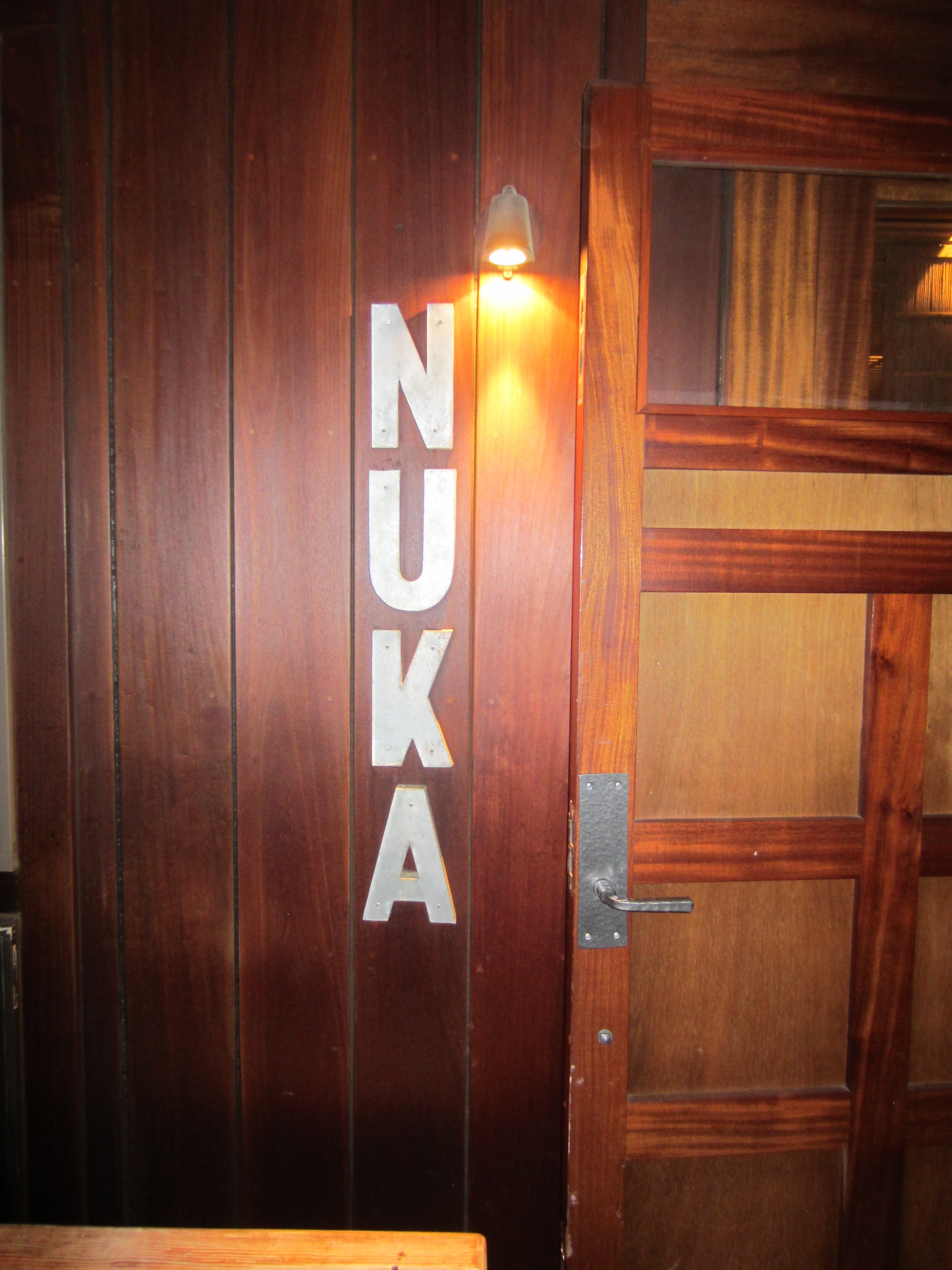The Nuka Buzz
Where else, but on Maui, can you go to a trendy sushi bar in a tiny upcountry town and talk to a dear friend about forgiveness and compassion, and then get involved in a conversation (over a frosted bottle of Ginjo Sake) with a pro surfer who surfs 30 foot waves at Jaws, and have a wild and self-revealing conversation about life, love, and relationships?
It’s 5:10pm on a Friday night, and I’m gearing up for an evening alone, quite happy to have some quiet time, when Christine, my closest friend for 35 years, calls. “Kenn and I wanted to see you tonight, but he has a touch of the flu. How would you like to get some dinner at Nuka together?”
“Nuka? I’d love to.”
“About 20 minutes?”
“Perfect. I’ll see you there.”
I love these spontaneous get-togethers. When I arrive at the restaurant it’s already full, except for two seats at the sushi bar. Nuka is a very “happening” place, even at this early hour. I take the two seats, giving a friendly nod to Jiro, the sushi chef. A few moments later Christine arrives, looking beautiful as ever, with her blue-green eyes, flowing golden-blond hair, simple black dress, and a scarf dramatically wrapped around her neck.
 “You looked like you just stepped out of one of the Outlander series,” I say, as I give her a hug. “A wee bonnie lass!”
“You looked like you just stepped out of one of the Outlander series,” I say, as I give her a hug. “A wee bonnie lass!”
“Oh, I love that series. I’m sure I lived so many lives in Scotland.”
We sit down on the stylish aluminum chairs and order our drinks along with a Rainbow Roll and a Haleakala Roll.
Business out of the way, Christine turns to me. “Peter, what’s been happening? How are you doing?” She’s been such a friend all these years.
“I’m great. I can’t believe how well I’m doing,” I say with a smile. “Susan and I have made a huge turn-around. We’ve dramatically changed how we relate to each other.”
“I’m so relieved to hear that.”
“I have to hand it to Susan. She’s the one who saw what was happening and changed her behavior.”
Susan and I went through a difficult time after we got married three years ago. A month into the marriage she got very sick. I had already been in two marriages with very sick wives. Both of them died. Here I was, stuck in it again, and I was pissed. Despite all my best intentions, my anger leaked out in sneaky passive aggressive ways. She responded with her own anger. Things began to fall apart.
 We eventually divorced, but then, cautiously, began to see each other again. I got some extraordinary help from my two therapists, David and Tom, and over time we created a new relationship, based on love and trust.
We eventually divorced, but then, cautiously, began to see each other again. I got some extraordinary help from my two therapists, David and Tom, and over time we created a new relationship, based on love and trust.
“If we hadn’t done the inner work,” I say, “we would have done the same thing in the next relationship.”
“You’re so right.”
“It’s sad for me to see how some of my friends can’t forgive us for what went on during those years. We’ve forgiven each other. It was both our faults. We got into a tailspin and couldn’t get out. We made mistakes.”
Christine reaches out and touches my arm. “Well, I admire that you both didn’t give up, and were willing to look at your stuff.”
At this point our drinks appear. Christine and I touch glasses and make a toast: “To our friendship and Kenn getting over the flu, and to Susan.”
I take a cool sip of Chardonnay. “You know me,” I smile, feeling an instant buzz from the wine, “I just want everyone to get along and be happy.”
“I agree with you that many find it hard to let go of anger. Look at our teacher Yogi Amrit Desai. There are many who still can’t forgive him. Let’s reconsider, I say.”
Amrit Desai was the head of a large spiritual community that Christine and I were involved in for many years. He was adored by hundreds of followers. When a long hidden secret emerged that he had sex with five of his female disciples, the outrage was volcanic. Many couldn’t forgive him for this violation of their spiritual trust.
“It’s true,” I say. “That was twenty years ago. It’s time to get over it. When I spoke to Amrit a few weeks ago, I ended the call saying, ‘Amrit, I love you.’ I just can’t see him as the enemy.
“You’re so right. We’re just poisoning ourselves when we’re angry. It turns around to bite us, closing our hearts.”
I nod my head in agreement. “The Hawaiians have an ancient tradition of ho’oponopono. Have you heard of it?”
“Yes, I learned about it in my hula class. It’s a practice of forgiveness.”
“I find it so powerful. If someone in the community does something wrong, they go before their family and admit their error. They say to everyone present, ‘I love you. I’m sorry. Please forgive me.’”
“That’s beautiful.”
“We have so much to learn from the Hawaiians. I wish there was more forgiveness in the world.”
“Peter, as you well know, all we can do is live our lives. We can’t change anyone. They’ll come to it when they come to it.”
“Or not,” I say, taking another sip.
I’ve been so involved in our conversation that when I suddenly become aware of my surroundings, I’m almost overwhelmed by the noise and the hubbub. The place is packed and everyone is talking excitedly.
“Wow,” I’m really getting a buzz,” I smile.
“Me too, Christine laughs.
We both turn around and survey the crowd. What a diverse group – young couples chatting animatedly, some older people I recognize from around town, a group of six women celebrating a birthday, a Japanese family. The front door is open to the outside and there is no air conditioning, just a fan on the bar, helping cool the wildly busy staff at the deep fryers, cooking crispy calamari, Asian fries, and other mouth-watering dishes. The servers, all attractive women in black trousers and shirts, rush back and forth.
Our food arrives, looking delicious. Christine’s Rainbow Roll has small pieces of sushi beautifully arranged on the plate. The Haleakala Roll is a baked California roll with salmon and dynamite sauce on top. Thoughts about forgiveness melt into the background as we turn our attention turns to the food.
A few bites in, I notice two young guys sitting at the sushi bar next to us, drinking from a small frosted bottle with a pink hibiscus on the front. They see me looking.
“What’s that?” I ask, almost having to shout over the noise.
“Ginjo,” one of them says. He has tattoos up both arms, and is wearing a grey t-shirt with a wild orange logo on the front. I can tell he’s a local because of his white trucker cap with the word “shaka” on the front, meaning “hang loose.”
“Ginko?” Christine queries.
“Ginjo,” the other one says. He’s in a black t-shirt and is has short reddish hair. “It’s sake. Do you want to try some?”
I hold up my glass of Chardonnay. “I’m fine,” I say, a little embarrassed to take them up on their offer.
“Sure,” says Christine. “I’ll try some.”
I drop my inhibitions and take a sip. The cool, smooth sake is delicious, and the sharing of this delightful libation leads to introductions and an extraordinary interchange between the four of us. The guy with the cap is Lonny. He was born on Maui. The other one is Zack. It turns out they are both cousins, close friends, and both have families and children.
A few more questions and we discover that Zack is a pro surfer.
“Do you have any pictures?” Christine asks.
Zack pulls out his phone, and after searching for a bit, shows us a photo. Holy shit, it’s a picture of him surfing a thirty-foot wave at Jaws. I almost fall off my chair. As a beginning surfer I’m only now realizing what an extraordinary feat that is. It’s one thing to look at videos, another to see a big wave curling up that can kill you. I’m in awe. I feel like a kid meeting a sports hero.
“You really surf that?” Christine asks, equally astonished.
Zack smiles, as if he is used to being asked the question. “I also have a surf school,” he says.
Our conversation unfolds, as we self-reveal into deeper and deeper levels. It’s one of those rich interchanges, full of unexpected twists and turns, a little like riding a wave, taking us to places we never dreamed of.
We part with promises to keep in touch. “I’ll call you for a lesson!” I say.
“Anytime. I’m on the Internet: Zack Howard.”
Christine and I leave the restaurant with that delicious “only on Maui” feeling. On our way out we meet a friend we know, and exchange happy greetings. I’m as high as can be. She heads off with some take-out for Kenn; I drive the half-mile back to my place, wondering what happened to all those concerns about forgiveness. It’s just another letting go. I can’t change anyone else. I can only change myself.
Forgiveness means freedom: it brings on liberation. It is tremendously freeing to keep your heart open. Closing the heart keeps you in prison. Sri Prem Baba

